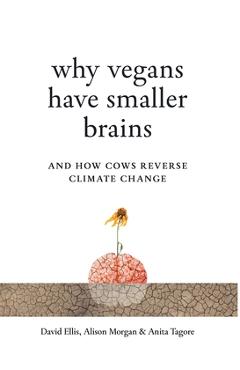Why Vegans Have Smaller Brains: And How Cows Reverse Climate Change - David Ellis

Detalii Why Vegans Have Smaller Brains:
libris.ro
238 Lei
264.45 Lei
Health & Fitness
David Ellis
Why Vegans Have Smaller Brains: - Disponibil la libris.ro
Pe YEO găsești Why Vegans Have Smaller Brains: de la David Ellis, în categoria Health & Fitness.
Indiferent de nevoile tale, Why Vegans Have Smaller Brains: And How Cows Reverse Climate Change - David Ellis din categoria Health & Fitness îți poate aduce un echilibru perfect între calitate și preț, cu avantaje practice și moderne.
Preț: 238 Lei
Caracteristicile produsului Why Vegans Have Smaller Brains:
- Brand: David Ellis
- Categoria: Health & Fitness
- Magazin: libris.ro
- Ultima actualizare: 28-10-2025 01:22:05
Comandă Why Vegans Have Smaller Brains: Online, Simplu și Rapid
Prin intermediul platformei YEO, poți comanda Why Vegans Have Smaller Brains: de la libris.ro rapid și în siguranță. Bucură-te de o experiență de cumpărături online optimizată și descoperă cele mai bune oferte actualizate constant.
Descriere magazin:
Many people have become resigned to the idea that heart disease, cancer, Alzheimer\'s or another degenerative disease will kill them. This thought-provoking and topical book shows that these illnesses were not our fate in pre-history and they need not be our destiny in the future. It explains how we can prevent and reverse many chronic diseases by eating the diet that drove human evolution, a diet based on meat, animal fat and offal. An Oxford University study found that the less animal food you eat, the more your brain shrinks with age. Brain scans from breast-fed babies of vegan mothers also show brain atrophy owing to a deficiency of B12, a vitamin that is not present in any plant food. This groundbreaking book reveals why plant-based eating is not only harming human health, it is also harming the planet. The authors explain why a pasture-reared meat diet is more ethical and humane than a vegetarian or vegan diet. They show how crop farming is causing climate change, soil destruction, animal suffering and ecological disaster. The flawed logic that we should replace meat with plant-based food means that environmental destruction will continue, along with the socio-economic costs of diet-related disease. In contrast, regeneratively-grazed cows mitigate climate change, enrich soils, support wildlife and provide nutritious food. The authors firmly anchor the health benefits of an all-meat diet with farming and the environment. This book comes at a time of health and environmental crises, when the public has never been more interested in these issues, yet equally never more confused. With qualifications in medicine, nutrition, geology and agriculture, the authors bring together a unique combination of expertise in health, diet, earth sciences and the impact of farming systems on the environment.

Produse asemănătoare

Why Vegans Have Smaller Brains: And How Cows Reverse Climate Change - David Ellis
![]() libris.ro
libris.ro
Actualizat in 28/10/2025
238 Lei
Produse marca David Ellis

Why Vegans Have Smaller Brains: And How Cows Reverse Climate Change - David Ellis
![]() libris.ro
libris.ro
Actualizat in 28/10/2025
238 Lei




